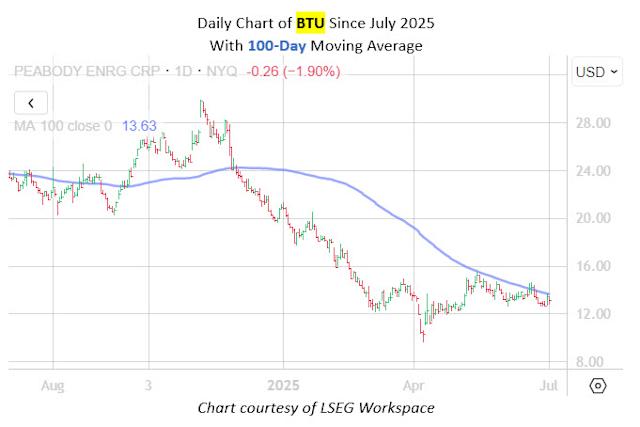
Crude stock Peabody Energy Corp (NYSE:BTU) is 1.9% lower to trade at $13.24 at last check, extending its long-term slide on the charts. BTU has already shed 37% in 2025, one of many oil names struggling of late. In fact, the security's pullback may have only just begun, as the shares are near a historically bearish trendline on the charts.
Invest in Gold

Thor Metals Group: Best Overall Gold IRA
Learn More
Priority Gold: Up to $15k in Free Silver + Zero Account Fees on Qualifying Purchase
Learn More
American Hartford Gold: #1 Precious Metals Dealer in the Nation
Learn More Powered by Money.com - Yahoo may earn commission from the links above.Per Schaeffer's Senior Quantitative Analyst Rocky White, the security is within one standard deviation of its 100-day moving average. BTU was below this this trendline in at least eight of the last 10 trading days and spent 80% of the last two months below it. Within these parameters, five other signals occurred in the past five years, after which the equity was lower one month later every time, averaging an 8.07% drop. A move of comparable magnitude would place BTU near $12.
All four covering brokerage firms carry a "strong buy" recommendation on Peabody stock, leaving ample room for bear notes moving forward. An unwinding of bullish sentiment amongst options traders could provide headwinds as well. BTU's 50-day call/put volume ratio of 1.83 at the International Securities Exchange (ISE), Cboe Options Exchange (CBOE), and NASDAQ OMX PHLX (PHLX) ranks higher than 83% of readings from the past year.
Now looks like a good time to weigh in with options, too. BTU's Schaeffer's Volatility Index (SVI) of 59% ranks in the 31st percentile of its annual range, meaning options traders are pricing in low volatility expectations.
The present course of struggling oil stocks indicates a bearish trendline with increased potential for further decline based on recent market dynamics.
The recent downward movement in oil stock prices indicates a bearish trendline that looms over the struggling industry, posing challenges for investors to navigate amidst mounting uncertainties.
A potential bearish trendline appears on the charts of struggling oil stocks, signaling continued pressure in 20XX despite recent price fluctuation.
The recent developments suggest an increasing bearish trendline for struggling oil stocks, pointing to further challenges ahead in the sector.
The recent drop in oil prices has created a bearish trendline that looms large over struggling energy sector stocks, sentiments suggesting further consolidation or even declines could be imminent for some severely underperforming adr oil companies.
The oil stock sector appears to be teetering on the edge of a downward trendline, signaling potential challenges for struggling players in this space.
The persistent decline in oil stocks is M diabolically reflected by the growing bearish trend line, signaling a challenging outlook for struggling energy shares.
With the bearish trendline looming over struggling oil stocks, it seems inevitable that these industries will face prolonged periods of turmoil and downsizing due to continued depressed prices.
The ongoing weakness in oil prices and the negative momentum displayed by struggling energy stocks suggest a bearish trendline intensifying amidst an uncertain global economic landscape, adding further uncertainty to investors' outlook.
The downward sloping trendline of struggling oil stocks portends a bearish outlook, with little indication for the sector's hoped-for recovery.
In the bearish sentiment of recent oil stock movements, one significant fear is that a trendline looks to be forming below struggling energy shares as investors exercise caution amid falling prices.
The current bearish trendline for struggling oil stocks portends a challenging outlook, indicating that the once prominent sector may be in store to see further price declines due largely from weak market demand and ongoing production concerns.
The recent decline in share prices suggests a bearish trendline looms over struggling oil stocks, signaling risk for investors amidst the downturn of global demand and uncertain market conditions.
The persistent downward trendline in the oil stock market, particularly affecting struggling firms within this sector prominently denotes a bearish outlook.
The latest market indicators point to a bearish trendline emerging for struggling oil stocks, signifying potential further downward pressure on their values due primarily from the ongoing challenges in global energy demand and supply dynamics.














